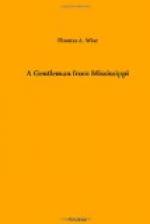When Randolph had finished Carolina took up her own defense, and eloquently she pleaded the defense of many a woman who yearns for what she has not got, for what may be beyond her reach—the defense of the woman who chafes under the limitations of worldly position, of sex and of opportunity. It was the defense of an ambitious woman.
“Perhaps I ought to have been a man of the Langdon family,” she exclaimed. “Father, oh, can’t you understand that I couldn’t doze my life away down on those plantations? You don’t know what ambition is. I had to have the world. I had to have money. If I had been a man I would have tried big financial enterprises. I should have liked to fight for a fortune. You wouldn’t have condemned me then. You might have said my methods were bold, but if I succeeded I would have been a great man. But just because I am a woman you think I must sit home with my knitting. No, father, the world does move. Women must have an equal chance with men, but I wish I had been a man!”
“Even then I hope you would have been a gentleman,” rebuked her father sternly. “Women should have an equal chance, Carolina. They should have an equal chance for the same virtues as men, not for the same vices.”
“But an equal chance,” returned the girl fervidly. “There, father, you have admitted what I have tried to prove. The woman with the spirit of a man, the spirit that cries to a woman. ‘Advance,’ ‘Accomplish,’ ’Be something,’ ‘Strike for yourself,’ cannot sit idly by while all the world moves on. If it is true that I have chosen the wrong means, the wrong way, to better my lot I did it through ignorance, and that ignorance is the fault of the times in which I live, of the system that guides the era in which I live.
“I am what the world calls ‘educated,’ but the world, the world of men, knows better. It laughs at me. It has cheated me because I am a woman. The world of men has fenced me in and hobbled me with convention, with precedent, with fictitious sentiment. If I pursue the business of men as they themselves would pursue it I am called an ungrateful daughter. If I should adopt the morals of men I would be called a fallen woman. If I adopted the religion of men I would have no religion at all. Turn what way I will—”
[Illustration: “You’ll have to take your medicine like A man.”]
“But not every woman feels the way you do, my daughter,” broke in the Senator.
“No, you are right, because their spirit has been crushed by generations, by centuries of forced subserviency to men. They tell us we should be thankful that we do not live in China, where women are physical slaves to men. In our country they are forced to be mental and social slaves to men. Is one very much worse than the other?”
“Then, dear,” and her father’s tone was very gentle, “if you want an equal chance—want to be equal to a man—you must take your medicine with Randolph, like a man.”




